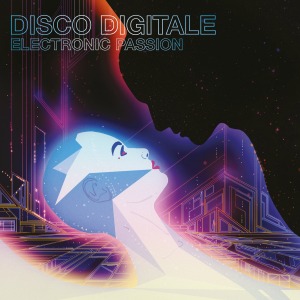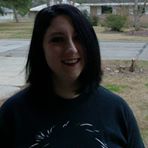Disco Digitale - Electronic Passion

There's a lot to love about Disco Digitale, and the Swedish trio, consisting of brothers Lars and Christer Bjorndal and Emma Hogander, keep alive the classic italo/hi-nrg sound, replete with cool analog synth laser effects that sound like an arcade game come to life circa 1982, staccato hand-clapping rhythms, and robotic vocoder voices. Their third album, Electronic Passion, a work-in-progress since 2008, was finally released last November, and most of the songs on it are highly enjoyable, but the album has two flaws dragging it down.
The more minor issue is a lack of variety. Almost all of the songs have similar tempos and arrangements, and don't stray very far from the template created by Trans-X's 1981 hit, "Living on Video." In isolation, the individual songs all have an ebullience that could make them radio-friendly club hits, but after hearing ten of them in a row, they can start to seem tedious. By the time the band changes up the sound with the album's closing song, "What We Leave Behind," the gesture can come across as too little, too late because you've already sat through forty minutes of similar-sounding songs. This doesn't seem like that big a deal, however, because much of the time, people don't listen to whole albums all the way through in a single sitting anymore. When you can listen to any song you want to at any time, too many songs with similar tempos on a given album no longer seems so detrimental. Also, as usual, the more I listened to this album, the more I liked it. "From Mir to You," "Luna Cafe," "Aurora," "What We Leave Behind," and "You Tell Me" are all songs I'll most likely put on a regular play-list.
The bigger problem lies with Christer's vocals. Emma's vocals consistently sound great, but through most of the album, Christer's vocals sound too thin and frequently have an irritating nasal quality. For the sake of comparison, I watched a few of the band's live performances on Youtube. Two of the songs, "Another World" and "Digital Love," were from their appearance at the 2014 Summer Electronic Festival, and one, "Silent Emotions," was from the 2006 Computer Dreams release party. Christer's live singing voice doesn't sound at all thin or nasally; it seems to have a fuller, richer sound that isn't coming through on the album. His vocals on "Luna Cafe" don't sound too thin, but might be a little muffled. The only song on the album I actually dislike is "The Future," and that's primarily because his voice sounds unbearably whiny there. There's a huge difference, however, between Christer's vocal quality on "The Future" and on "The Secret," where he sounds best. His vocals in "The Secret," are lower, fuller, richer, and stronger than anywhere else on the album. I don't know what they did differently during the recording or engineering of that song, but based on what I hear in the three live Youtube videos, his vocals in that song seem to come closest to matching his live singing voice. That's the sweet spot the producer or engineer should be aiming for. If Christer's vocals consistently sounded as good on the rest of the album as they do in "The Secret," my overall score for this album would go up by at least a full point. There are some good songs here, but a little more variety and less tampering with Christer's vocals would go a long way towards improvement. Mar 26 2015
The more minor issue is a lack of variety. Almost all of the songs have similar tempos and arrangements, and don't stray very far from the template created by Trans-X's 1981 hit, "Living on Video." In isolation, the individual songs all have an ebullience that could make them radio-friendly club hits, but after hearing ten of them in a row, they can start to seem tedious. By the time the band changes up the sound with the album's closing song, "What We Leave Behind," the gesture can come across as too little, too late because you've already sat through forty minutes of similar-sounding songs. This doesn't seem like that big a deal, however, because much of the time, people don't listen to whole albums all the way through in a single sitting anymore. When you can listen to any song you want to at any time, too many songs with similar tempos on a given album no longer seems so detrimental. Also, as usual, the more I listened to this album, the more I liked it. "From Mir to You," "Luna Cafe," "Aurora," "What We Leave Behind," and "You Tell Me" are all songs I'll most likely put on a regular play-list.
The bigger problem lies with Christer's vocals. Emma's vocals consistently sound great, but through most of the album, Christer's vocals sound too thin and frequently have an irritating nasal quality. For the sake of comparison, I watched a few of the band's live performances on Youtube. Two of the songs, "Another World" and "Digital Love," were from their appearance at the 2014 Summer Electronic Festival, and one, "Silent Emotions," was from the 2006 Computer Dreams release party. Christer's live singing voice doesn't sound at all thin or nasally; it seems to have a fuller, richer sound that isn't coming through on the album. His vocals on "Luna Cafe" don't sound too thin, but might be a little muffled. The only song on the album I actually dislike is "The Future," and that's primarily because his voice sounds unbearably whiny there. There's a huge difference, however, between Christer's vocal quality on "The Future" and on "The Secret," where he sounds best. His vocals in "The Secret," are lower, fuller, richer, and stronger than anywhere else on the album. I don't know what they did differently during the recording or engineering of that song, but based on what I hear in the three live Youtube videos, his vocals in that song seem to come closest to matching his live singing voice. That's the sweet spot the producer or engineer should be aiming for. If Christer's vocals consistently sounded as good on the rest of the album as they do in "The Secret," my overall score for this album would go up by at least a full point. There are some good songs here, but a little more variety and less tampering with Christer's vocals would go a long way towards improvement. Mar 26 2015
Share this review
Facebook
Twitter
Google+
Shares
Buy this release
Disco Digitale store
Disco Digitale - Electronic Passion is available at POPONAUT from 13,95€
Related articles
The Von Deer Skulls - 'The Damned Chapter'
Review, Oct 10 2014
Sonik Foundry - 'Explosive'
Review, May 30 2012
Beborn Beton
Interview, Aug 31 2015
Dana Jean Phoenix - 'Le Mirage'
Review, Mar 18 2017
Various Artists - 'Uturn 3: The Dark Side Of The Beat'
Review, Jan 01 2004





